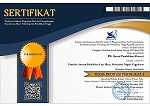Self-efficacy guru kelas dalam membimbing siswa slow learner
Fuadah Fakhruddiana, , Indonesia
Abstract
Abstrak: Tujuan dari penelitian ini adalah untuk mengetahui dinamika dan faktor-faktor self-efficacy guru kelas dalam membimbing siswa slow learner. Metode penelitian yang digunakan dalam penelitian ini adalah metode penelitian kualitatif dengan pendekatan studi kasus. Metode pengambilan data dilakukan dengan metode wawancara. Pendekatan analisis yang digunakan dalam penelitian ini adalah analisis isi (content analysis) serta menggunakan triangulasi sumber dalam uji kredibilitas penelitian. Berdasarkan hasil penelitian, Subjek I memiliki keyakinan dalam membimbing siswa slow learner. Subjek I memiliki banyak ide dan inovasi dalam mengatasi kelambanan siswa slow learner. Sedangkan faktor yang mempengaruhi self-efficacy Subjek I adalah pengalaman keberhasilan terdahulu, pengalaman orang lain, persuasi verbal, kondisi fisik dan afeksi, serta faktor berupa kondisi lingkungan sekitar. Untuk Subjek II, ditemukan bahwa subjek memiliki rasa pesimis dalam menghadapi siswa slow learner. Subjek II merasa kesulitan ketika menghadapi siswa slow learner, sehingga tidak banyak cara yang dilakukannya dalam menghadapi siswa slow learner. Faktor yang mempengaruhi self-efficacy Subjek II hampir sama dengan Subjek I yakni self-efficacy subjek dipengaruhi oleh pengalaman keberhasilan terdahulu, pengalaman orang lain, persuasi verbal dan kondisi fisik dan afeksi. Temuan dari penelitian ini adalah atmosfer sekolah yang ternyata memberikan spirit yang berbeda bagi kedua subjek.
Kata Kunci: guru kelas, self-efficacy, slow learner
Abstract: The purpose of this study was to determine the dynamics and factors of classroom teacher’s self-efficacy in guiding slow learner students. The method used in this research is qualitative research methods with case study approach. Method of data collection conducted by interview. Analysis approach used in this research is content analysis and using triangulation in research credibility test. Based on the research, the first subject has efficacy in guiding slow learner students. The subject has a lot of ideas and innovations in overcoming inaction slow learner students. While the factors was influence subject was namely enactive mastery experience, vicarious experience, verbal persuasion and physiological and affective states, and factors such as environmental conditions. For the second subject, it was found that the subject has a sense of pessimism in guiding of slow learner students. Subject find difficulties when she guiding slow learner students, so there isn’t a lot of ways that subject do in the guiding of slow learner students. Factors that influence self-efficacy of the second subject is influenced by four factors namely enactive mastery experience, vicarious experience, verbal persuasion and physiological and affective states. The conclusion from this study is that there are differences in self-efficacy of teachers in the face of slow learner students. Differences between subject I and subject II lies in the school atmosphere that gives a different spirit to the second subject.
Keywords: classroom’s teacher, self-efficacy, slow learner
Keywords
Full Text:
PDFDOI: https://doi.org/10.21831/jpk.v14i1.25161
Refbacks
- There are currently no refbacks.
Copyright (c) 2022 JPK (Jurnal Pendidikan Khusus)

This work is licensed under a Creative Commons Attribution-ShareAlike 4.0 International License.
Supervised by:
Our Journal has been indexed by:

JPK (Jurnal Pendidikan Khusus) is licensed under a Creative Commons Attribution-ShareAlike 4.0 International License.
Based on a work at https://journal.uny.ac.id/index.php/jpk.







